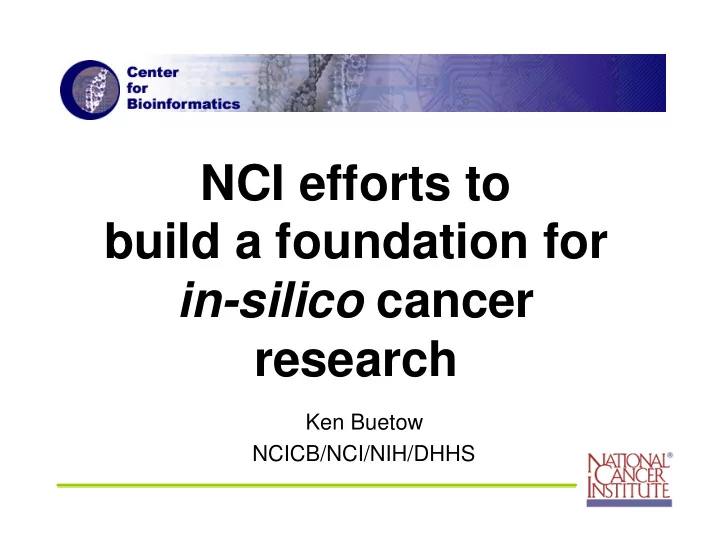

NCI efforts to build a foundation for in-silico cancer research Ken Buetow NCICB/NCI/NIH/DHHS
Incredible developments in biomedical information generation
Biomedical information tsunami • overwhelming volume of data • multitude of sources
Informatics tower of Babel • Each cancer research community and institution: – Speaks its own scientific “dialect” – Builds its own infrastructure and applications
NCI biomedical informatics • Goal: A virtual web of interconnected data, individuals, and organizations redefines how research is conducted, care is provided, and patients/participants interact with the biomedical research enterprise
Center for Bioinformatics building common architecture, common tools, and common standards access participating portals group nodes Clinical Trials Molecular Signatures NCI Core TGI Cancer GAI Genomics Mouse Models CCAP
caCORE – common ontologic representation environment • Information biomedical objects integration • Cross-discipline common data elements reasoning controlled vocabulary
…a sharing architecture Clients Presentation Object Layer Data • open Layer Sources Domain Objects source Genes HTML Web • open /HTTP Server Expression Browsers Databases development Tissues XML/ • open External HTTP Agents Apps URLs access Models RDF Agents • federated Diseases Flat Other Apps SOAP Files Trials Other Internal Java Apps
NCICB applications: • clincial trials support - C3DS • molecular pathology - caArray • cancer images - caImage • pre-clinical models - caModelsDb • laboratory support - caLIMS
electronic data capture for Clinical Trials • WWW accessible • Reusable eCRF library built using NCI CDEs • CTMS and CDUS reporting
http://caarray.nci.nih.gov/
Image Portal • The NCICB has developed an image portal to allow researchers to search for mouse and human images and annotations – Human and mouse images and annotations were provided by the MMHCC
Cancer (A) to Normal (B) Expression Ratio for breast on Chromosome 17 ERBB2
Cancer Biomedical Informatics Grid (caBIG ) • Common, widely distributed infrastructure permits cancer research community to focus on innovation • Shared vocabulary, data elements, data models facilitate information exchange • Collection of interoperable applications developed to common standard • Raw published cancer research data is available for mining and integration
Within a group, extended NCICB caCORE and local infrastructure join diverse data and connect it to public data sources
Cancer Biomedical Informatics Grid (caBIG)
caBIG principles • Open source • Open access • Open development • Federated
caBIG action plan • Establish pilot network of Cancer Centers – Groups agreeing to caBIG principles – Mixture of capabilities – Mixture of contributions • Expanding collection of participants • Establish consortium development process – Collecting and sharing expertise – Identifying and prioritizing community needs – Expanding development efforts • Moving at the speed of the internet…
Three Domain Workspaces and two Cross Cutting Workspaces will be launched during the Pilot phase DOMAIN WORKSPACE 1 Will address the need for consistent, open and Clinical Trial Management Systems comprehensive tools for clinical trials management. DOMAIN WORKSPACE 2 Will provide tools and systems to enable integration Integrative Cancer Research and sharing of information. DOMAIN WORKSPACE 3 Will provide for the integration, development, and Tissue Banks & Pathology Tools implementation of tissue and pathology tools. Will be responsible for evaluating, developing, and CROSS CUTTING WORKSPACE 1 integrating systems for vocabulary and ontology content, Vocabularies & Common standards, and software systems for content delivery Data Elements Will develop architectural standards and provide CROSS CUTTING WORKSPACE 2 architectural assistance as necessary to other workspaces. Architecture
acknowledgements • NCICB – Peter Covitz – Sue Dubman – Carl Schaefer – Mervi Heiskanen – Denise Hise – Kotien Wu – Frank Hartel – Sheri De Coronado – Gilberto Fragoso • LPG/CCR – Michael Edmundson – Bob Clifford – Cu Nguyen http://ncicb.nci.nih.gov http://cmap.nci.nih.gov http://caBIG.nci.nih.gov
Recommend
More recommend